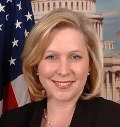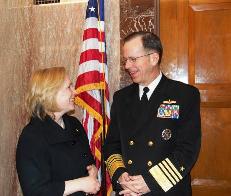|
Kirstin Gillibrand
US Senator,
New York
Speaks on Repeal
of Don't Ask Don't Tell
by Denny Meyer
|
 |
On August
5th, 2009,
Gay Military
Signal spoke
with New
York's
Senator
Kirstin
Gillibrand
about her
recent
success in
arranging
the first
Senate Armed
Services
Committee
hearing on
Don't Ask
Don't Tell (DADT) since
1993, to
take place
this coming
Fall.
Senator
Gillibrand
was
appointed by
New York
Governor
David
Paterson to
replace
Hilary
Clinton when
she became
Secretary of
State.
Gay Military
Signal:
Senator,
congratulations
on being the
senator from
New York, who
is
championing
progress on
the DADT
issue.
What
inspired you
to take up
the issue of
DADT in the
senate and
work toward
the senate
holding its
first
hearing on
the issue
since the
early 1990s?
Senator
Kirstin
Gillibrand:
I have been
working on
issues of
concern to
service
members and
veterans
over the
last few
years
because I
was a member
of the House
Armed
Services
Committee.
And I've
spent a lot
of time
speaking
with service
members and
veterans.
I recently
had a
meeting with
Lt. Choi.
And the
meeting we
had was very
inspiring to
me because
he described
how military
policy is
that you are
told never
to lie.
But, in
fact, he is
asked to lie
every day
about who he
is. I
thought that
was
particularly
compelling
and really
put an
emphasis on
how
distorted
this policy
truly is;
and how
destructive
it is.
And, so, I
told him I
would do
everything I
could to
repeal Don't
Ask Don't
Tell.
And I
started
looking into
how I could
make that
happen.
I had a bill
already that
I was
co-sponsoring
with a
congressman
on the House
side,
Congressman
Murphy.
I started to
talk with
the chairman
of the
Senate Armed
Services
Committee,
Senator
Carl Levin,
about what
it would
take to
change this
policy.
I started to
look for the
votes that
would pass
it; you need
sixty votes;
and I
started
talking with
my
colleagues
and working
with the
advocacy
groups that
we thought
would be
supportive
of the
repeal.
My bill was
specifically
to do a
moratorium,
because
Senator
Kennedy had
the repeal
bill that he
wanted to
introduce.
So, I
decided that
in the
absence of a
full repeal,
we could at
least offer
a request to
have a
moratorium
for eighteen
months, while
the
president
and the
military
decided what
to do about
the policy.
During that
eighteen
months, no
one could be
dismissed.
So, we
started
counting
votes and we
did not get
sixty.
We decided
with the
advocacy
groups that
it was
better not
to offer
that and
fail on the
vote.
(We decided)
instead to
ask the
chairman (of
the Armed
Services
Committee),
Senator
Levin, for
a hearing.
And the
Chairman was
very
supportive.
He said that
he thought a
hearing
would be
timely.
And he
thought that
in light of
the
president's
views,
a hearing
was
appropriate.
And this
will be the
first Senate
hearing on
the topic
since 1993.
I believe
it's a major
step toward
repeal.
GMS: Would
you describe
any of your
discussions
or
interaction
with Senator
Kennedy and
his staff on
this issue?
KG: We
worked with
his office.
I haven't
talked with
the Senator
directly
about it,
but we
talked with
staff a lot.
GMS: Would
you describe
any of those
discussions?
KG: They are
very
supportive.
The Senator
(Kennedy)
wants to
introduce
that at the
appropriate
time.
And when he
introduces
it, I will
be an
original
co-sponsor.
What was the
deciding
factor or
issue that
ultimately
resulted in
the
agreement to
hold a
hearing?
KG: I
think that
the chairman
was very
interested
in the fact
that I was
going to
introduce
the
amendment
and I was
trying to
earn the 60
votes that
were
necessary.
And I think
he believed
that this
hearing was
timely as
this is a
policy that
does need
revision.
You'd have
to ask him
about any
details
beyond that.
GMS: It is
understood
that,
although you
are not on
the Senate
Armed
Services
Committee,
you served
on the House
Armed
Services
Committee.
We would
like your
views on
DADT, based
upon your
experience
in the U.S.
House of
Representatives:

Senator Gillibrand with JCS Chair Admiral Mullen |
In the
'about'
section of
your
website, you
state:
"Honoring
veterans in
her district
in upstate
New York and
across the
country has
been a
hallmark of
Senator
Gillibrand’s
time in
Congress. As
a member of
the Armed
Services
Committee,
she authored
legislation
to help
veterans
receive the
benefits
they earned
and fought
for the
greatest
investment
in veteran’s
benefits
since World
War II. From
her post on
the
committee,
Gillibrand
was also a
leading
sponsor of
legislation
to
strengthen
our nation’s
security and
emergency
preparedness." |
Would you
agree that
the Military
Readiness
Enhancement
Act (the
current
House bill
that would
repeal DADT)
would
strengthen
our nation's
security by
enabling all
Americans to
choose to
volunteer to
serve in
pride
regardless
of their
sexual
orientation?
KG:
Absolutely;
I think its
a great bill
and I hope
we can pass
it.
GMS:
It is
understood
that there
had been
some
misunderstanding
and even
mischaracterization
regarding
your support
of the
repeal of
DADT while
in the House
of
Representatives.
HRC, in
fact,
clarified
that you
have and do
support DADT
repeal as
well as
other gay
rights
issues.
Would you
comment on
why you were
not a
co-sponsor
of the
Military
Readiness
Enhancement
Act while a
U.S.
Representative?
KG: No, I
never
co-sponsored
it. I
should have
co-sponsored
it; it was
just not a
bill that
was moving
at the time.
It was not a
bill that
was at the
forefront of
my veterans'
advisory
board
agenda.
The issue
that was
most timely,
when I was
in the
House, was
the issue of
the backlog
of paperwork
that so many
veterans
were
experiencing.
They were
coming back
from Iraq
and
Afghanistan
and they
could not
get access
to
specialists
or treatment
for high
levels of
post
traumatic
stress
disorder and
brain
injuries;
and (they
had) no
ability to
see
therapists
or
specialists.
So, the
urgency that
came up on
my veterans'
advisory
board was a
focus on
"how do we
streamline
the VA and
how do we
make the VA
more
responsive
the needs of
the
veterans."
I wrote two
bills; one
that was
implemented,
to make sure
that DOD
wrote a
manual for
veterans
every year
that
outlines
every
benefit that
they are
eligible
for.
That came to
my attention
when I met
vets at
Wounded
Warriors
events in my
district in
the Catskill
Mountains
(NY).
They said, "Kirstin,
we just had
a law firm
do this pro
bono, but we
should have
this
(information
provided)
every year.
I spoke to
the law
firm; they
spent two
million
dollars of
pro bono
services to
get this
manual done.
So, my bill
would have
the military
do that.
Actually,
the military
(then) went
ahead and
did it; so
the bill did
not
ultimately
get voted on
because they already
implemented
what we
wanted them
to do.
Second, I
wrote a bill
called Pro
Vets which
was to make
the VA more
proactive as
opposed to
reactive.
Because,
what is
happening is
that right
now veterans
have to
apply to
find out
which
benefits
they are
eligible
for. I
want the VA
to notify
veterans
proactively,
what
benefits
they're
eligible
for. I
want them to
be able to
transfer
medical
records
directly
from DOD to
the VA in a
streamlined
way so that
they can
avoid that
adversarial
process that
happens now
of a veteran
having to
prove what
his level of
injury is,
after he is
off active
duty, when
he becomes a
veteran.
So I'm now
working on
that bill on
the Senate
side.
Regarding
the
question;
I've always
supported
the repeal
of Don't Ask
Don't Tell;
the lack of
co-sponsorship
was not an
indication
of my lack
of support.
There are a
lot of bills
that I would
vote for
that I just
didn't get
around to
co-sponsoring.
In fact if
you look at
my voting
record, I
have a 100
percent pro
gay rights
voting
record on
all issues.
GMS: I
very much
appreciate
all of that.
In you
position on
the Foreign
Relations
Committee,
have you
reviewed any
reports
regarding
the
experience
of our
allied
nations
where open
service of
homosexuals
has been
permitted
since the
early 1990s,
particularly
in the
United
Kingdom,
Canada,
Australia,
and Israel?
KG:
No, but I've
read about
it. I
haven't
gotten to
see any
reports, but
I've read
about the
successes they've
had.
And some of
the evidence
that I hope
we develop
in this
hearing is
(of) the
grave loss
we've
suffered
because of
this policy.
We've lost
over 13,000
service
members who
have been
discharged
because of
their sexual
orientation
since 1993.
And the
Government
Accountability
Office has
said that
the cost was
almost 200
million
dollars,
because of
this policy
for both the
recruiting
costs and
the training
of
replacements
for those
that have
been
discharged.
And Third,
we've lost
some of our
most
important
experts,
some of the
most mission
critical men
and women
that have
been
dismissed.
Of the
13,000 they
estimate
that about
800 mission
critical
people,
including a
lot of our
foreign
language
speakers
-nearly ten
percent of
our Arabic
and Farsi
speakers
have been
dismissed;
which is a
very high
number when
we're trying
to fight
terrorism.
GMS: In
referring to
our Gay
Military
Signal
on-line
"Don't Ask
Don't Tell
fact sheet"
at
http://www.gaymilitarysignal.com/DADTfacts.html
, which
includes the
loss of
those who
simply do
not reenlist
due to the
policy,
would you
comment on
that and
related
issues?
KG: That is
another
level of
loss.
I think that
the policy
is hostile
to the
military; I
think it is
destructive;
and I think
it
undermines
our
strength.
GMS: Thank
you.
What would
you like to
add in
closing?
KG: I
think the
tide is
changing.
There is a
change afoot
and it is
something
that is
going to be
very
transformational.
Its
happening
across the
board,
putting gay
rights at
the
forefront of
the civil
rights
debate;
because this
is an issue
of civil
rights and
equal
justice and
basic
fairness.
I'm very
optimistic
that we will
make
progress and
that many of
my
colleagues
will be in a
position
where they
can support
a repeal.
©
2009 Gay Military Signal
|